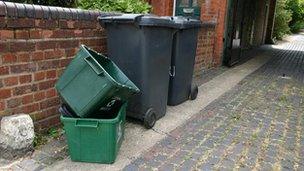Vote 2012: Back to the polling booth for local elections
- Published

Money is tight for local councils, which run services such as rubbish collection
You'll be forgiven for suffering from ballot box fatigue.
Wales had three opportunities to vote last year - in the assembly elections and in the referendums on the assembly's law-making powers and the Westminster election system.
On 3 May you will be invited back to the polling booth for elections in 21 of Wales' 22 local authorities - all bar Anglesey, which is being run by ministerially-appointed commissioners after years of political infighting.
It's your chance to elect the more than 1,200 members of Wales' unitary authorities - the people who decide whether to turn off street lights at night and how much you pay in council tax.
And they're not the only ones who want a say over your neighbourhood.
The Institute of Welsh Affairs think-tank estimates there are some 8,000 town and community councillors in Wales, serving 70% of the population.
So why should you care who does the job?
After all, local councillors are hardly taking big decisions about war and peace or the state of the nation's finances.
Perhaps not, but they are taking decisions that affect your finances.
We pay more than £1bn in council tax every year, around a fifth of the local government budget. The rest comes from the Welsh government.
That money pays for services we depend on every day and the wages of more than 150,000 people who work for local authorities.
Social care, schools, transport, housing: many of the cradle-to-grave services are run from council chambers.
But money is tight. Like the rest of the public sector, councils are feeling the pinch from the UK-wide austerity drive.
The Welsh government has been encouraging them to stretch resources by ignoring their boundaries and sharing services.
With funding becoming scarce, the expectation for them to co-operate is growing.
Welsh Local Government Association chief executive Steve Thomas says there have been "severe" cuts to capital budgets, which pay for things like road and school building, and to revenue spending, prompting a pay freeze for the workforce.
"It has been particularly hard in terms of keeping and maintaining the current level of service," he says.
He says councils have co-operated and cut costs, "but the problem is in the next five years we have to keep our foot on the gas because public expenditure will decline further".
Cuts
Mr Thomas says: "The resources are not there to embark on huge programmes of spending. People who are getting elected in 2012 their key democratic factor over the next period will be to ensure that services are kept afloat and to make cuts, unfortunately, in key areas."
So this election could be your chance to have a say over where the axe falls.
But a vote in a council election isn't all about local services. The outcome will inevitably be seen as a verdict on the direction of the country.
The last local elections in 2008 were held against the backdrop of a deteriorating economy and the 10p tax row.
Since then, Labour and the Conservatives have swapped roles in Westminster and traded places in the opinion polls.
Like the Conservatives, the Liberal Democrats will be mindful of limiting the damage caused by any unpopular actions taken by their coalition UK government.
Plaid Cymru have a new leader in Leanne Wood, but is playing down expectations of making big strides.
Even though the political balance of power has changed, this is another election that could be determined by the money in voters' pockets.
The economy is still faltering and where we had the row about the 10p tax band in 2008, we now have rows about tax increases on pasties and tax cuts for the wealthy.
So muster your enthusiasm for another opportunity to vote. And then muster it again - elections for police commissioners take place for the first time in November.